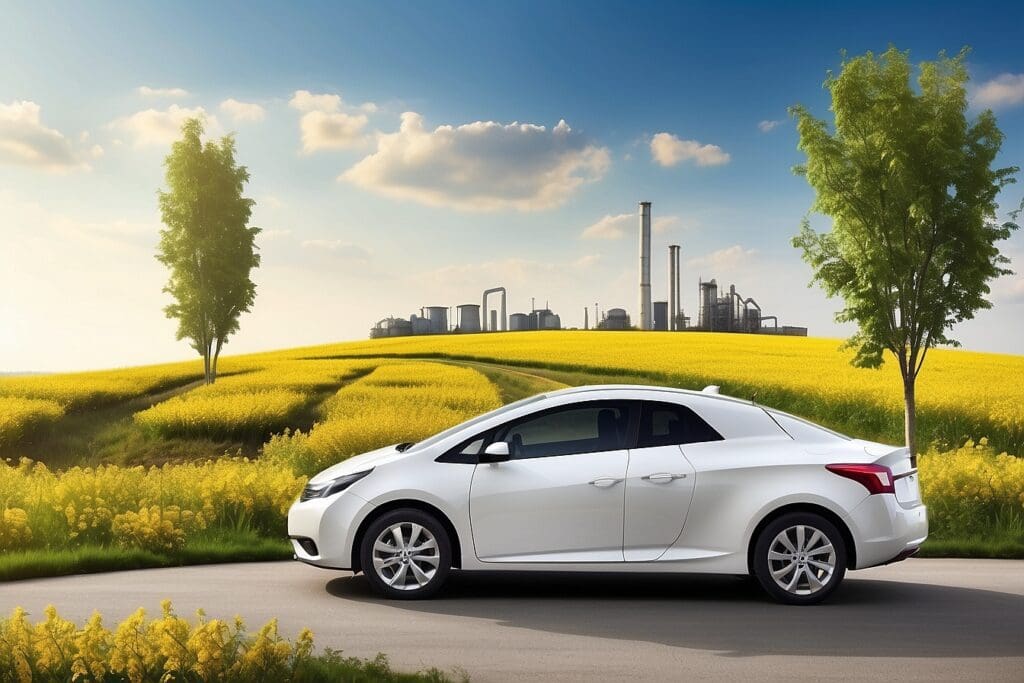As we grapple with the formidable task of curbing our carbon footprint, many of us are caught in a quandary over which green lifestyle choices to adopt. Rest assured, you’re not alone; in our own search for sustainability, we’ve delved into the myriad possibilities renewable energy offers.
This journey has brought biofuels into sharp focus – an exciting prospect that’s gaining traction as a cleaner way to fuel our vehicles. Join us as we explore how these sustainable sources can help put your environmental conscience into higher gear.
Key Takeaways
- Biofuels like biodiesel and ethanol are renewable sources of energy that come from organic materials, significantly reducing greenhouse gas emissions compared to fossil fuels.
- With government support through initiatives and policies, the biofuel market is expanding as demand for sustainable and renewable fuel alternatives grows.
- Advancements in biofuel technology are making these fuels more efficient and cost – effective, with potential for an even broader range of applications in the automotive sector.
- The use of biofuels can decrease our dependence on non – renewable energy sources, contributing to environmental conservation and a reduction in carbon emissions from transportation.
- Governments around the world are promoting the adoption of biofuels with financial incentives, creating infrastructure, setting renewable fuel standards, regulating emissions, funding research and development.
Understanding Biofuels

Biofuels are renewable energy sources derived from organic materials such as plants and waste. They come in various types including biodiesel, ethanol, and hydrogen, each with its unique production process and application in the automotive industry.
Definition
Biofuels stand as a beacon of sustainable energy, harnessing the power of renewable resources to fuel our vehicles. We’re talking about fuels like ethanol and biodiesel derived from plant materials, which are essentially solar energy stored in chemical form.
These aren’t your typical petrol or diesel; biofuels come from organic sources—corn, sugarcane, vegetable oils—and release fewer carbon emissions into our atmosphere.
They offer us a greener way to drive, a bridge towards cleaner air and a reduced environmental footprint. As we delve deeper into types of biofuels such as hydrogen fuel cells and various ethanol blends, it becomes clear that each has unique benefits for green transportation.
Transitioning smoothly from what constitutes these eco-conscious automotive power alternatives..
Types (biodiesel, ethanol, hydrogen, etc.)
After understanding the definition of biofuels, it’s important to explore the different types available. Each type offers unique advantages and applications in the realm of environmentally friendly fuel options.
- Biodiesel: Made from renewable resources such as vegetable oils and animal fats, biodiesel is a cleaner-burning alternative to traditional diesel fuel.
- Ethanol: Derived from plant materials like corn or sugarcane, ethanol is a widely-used biofuel that can be blended with gasoline to reduce emissions.
- Hydrogen: While not as prevalent as biodiesel or ethanol, hydrogen fuel cells hold great potential for powering vehicles without emitting harmful pollutants.
- Biogas: Produced from organic waste materials, biogas can be used to generate electricity, heat, or as vehicle fuel, offering a sustainable way to manage waste while reducing reliance on fossil fuels.
- Bioethers: These are oxygenated compounds that can be added to gasoline to improve its combustion efficiency and reduce emissions.
Environmental Sustainability of Biofuels
Biofuels have a positive impact on greenhouse gas emissions, making them a sustainable alternative to traditional fossil fuels. When compared to fossil fuels, biofuels are considered to be more environmentally friendly and have the potential to reduce carbon emissions in the transportation sector.
Impact on greenhouse gas emissions
Biofuels, such as biodiesel and ethanol, have a significant impact on reducing greenhouse gas emissions when compared to traditional fossil fuels. They produce fewer carbon emissions during combustion, thus helping to mitigate climate change by lowering overall carbon dioxide levels in the atmosphere.
As an environmentally conscious alternative, biofuels play a critical role in promoting cleaner air and mitigating the detrimental effects of global warming.
Additionally, biofuels contribute to decreasing our reliance on non-renewable resources while bolstering sustainable fuel options for vehicles. The transition towards biofuels can lead to a substantial reduction in harmful pollutants emitted by cars and other transportation modes, offering an effective solution for those seeking eco-friendly energy sources.
Comparison to fossil fuels
When we consider the environmental sustainability of biofuels, it’s essential to compare them with traditional fossil fuels. Below is a table that highlights key differences:
| Aspect | Biofuels | Fossil Fuels |
|---|---|---|
| Greenhouse Gas Emissions | Lower emissions due to carbon neutrality | High emissions contributing to climate change |
| Renewability | Renewable resources like plants or waste | Non-renewable and depleting resources |
| Energy Balance | Positive energy balance, more energy output than input | Negative energy balance, high energy input for extraction |
| Environmental Impact | Biodegradable, less toxic pollutants | Oil spills and extraction harm ecosystems |
| Economic Impact | Potential for local job creation and energy independence | Market volatility, geopolitical tensions over resources |
We see that biofuels offer a cleaner, more sustainable path forward. As we transition away from oil, gas, and coal, the role of biofuels becomes even more significant. Let’s now delve into another aspect of sustainable transportation — the comparison between biofuels and electric vehicles.
Biofuels vs Electric Vehicles
While biofuels offer a sustainable alternative to fossil fuels, electric vehicles also provide clean energy solutions. Biofuels have the advantage of being compatible with existing automotive infrastructure, while electric vehicles offer zero emissions and lower operating costs.
Both options are important for reducing our reliance on traditional fuel sources.
Advantages and disadvantages
Biofuels offer several advantages, including lower greenhouse gas emissions compared to traditional fossil fuels. They are renewable and can be produced from sustainable sources like algae, corn, sugarcane, and waste oils. Moreover, biofuels can reduce dependence on imported oil and contribute to energy security. On the downside, there are concerns about the impact of large-scale biofuel production on food prices and land use. Additionally, some biofuels may require significant resources for production and distribution.
It’s important to weigh these pros and cons when considering the adoption of biofuels as a clean energy solution for transportation. While they offer promise in reducing carbon emissions and reliance on non-renewable resources like petroleum, careful consideration is required to mitigate potential negative impacts on food supply chains and natural ecosystems.
Demand and market trends
The demand for biofuels is steadily increasing as eco-conscious individuals seek sustainable and renewable fuel alternatives. Market trends show a growing interest in green transportation options, such as biodiesel and ethanol, reflecting the shift towards environmentally friendly fuels.
As government initiatives promote sustainability and reduce reliance on fossil fuels, the market for bioenergy continues to expand. Companies are investing in clean fuel technology, meeting the rising demand for low-carbon transportation solutions.
Advancements in biofuel production methods and potential reductions in greenhouse gas emissions drive consumer interest in alternative energy sources for automobiles. The market outlook indicates a promising future for biofuels as an eco-friendly vehicle power solution while contributing to fuel efficiency and reducing environmental impact within the automotive industry.
The Future of Biofuels

The future of biofuels holds great promise as development and advancements continue to make these sustainable alternatives more efficient and cost-effective. With potential for reducing reliance on fossil fuels, government initiatives and policies are driving the adoption of biofuels in the automotive industry.
Development and advancements
Biofuels continue to undergo significant development and advancements, with ongoing research into improving their efficiency and reducing production costs. Scientists are exploring innovative methods for converting non-food biomass, such as algae and agricultural waste, into biofuels.
Advancements in technology have also led to the creation of more efficient biofuel production processes, making them a promising alternative for eco-conscious drivers.
Additionally, ongoing advancements are expanding the range of vehicles that can use biofuels, including flex-fuel cars capable of running on higher blends of ethanol. Furthermore, emerging technologies like cellulosic ethanol and advanced biodiesel hold great promise for further reducing greenhouse gas emissions from transportation.
These developments show potential for significantly reducing our reliance on fossil fuels while offering sustainable fuel alternatives for low-carbon transportation solutions.
Potential for reducing reliance on fossil fuels
Biofuels offer a promising solution for reducing our dependence on fossil fuels. They have the potential to decrease our reliance on non-renewable sources of energy, which often contribute to environmental degradation and accelerated climate change.
By embracing biofuels as an alternative for powering vehicles, we can work towards a greener future while lessening the impact of traditional fuel consumption.
Furthermore, the development and expansion of biofuel technology can pave the way for a more sustainable automotive industry. This shift has the potential to create a significant reduction in carbon emissions and promote eco-conscious transportation solutions, aligning with our collective goal of preserving the environment for future generations.
Government initiatives and policies to promote sustainability
As we consider the potential for reducing reliance on fossil fuels, it is essential to understand the government initiatives and policies that promote sustainability in biofuel production and usage. Here are some key actions taken by governments around the world to encourage the adoption of eco-friendly vehicle power alternatives:
- Incentives for biofuel production: Many governments offer financial incentives and grants to support the research, development, and production of biofuels. This includes tax credits for biofuel producers and subsidies for farmers growing feedstock crops.
- Renewable fuel standards: Governments have set targets for blending biofuels with traditional fossil fuels, ensuring a certain percentage of renewable fuels are used in transportation. This stimulates demand and market growth for biofuels.
- Environmental regulations: Stringent emissions regulations incentivise the uptake of low-carbon transportation solutions such as biofuels, imposing penalties on vehicles that do not meet specified emission standards.
- Investment in infrastructure: Government funding supports the development of infrastructure needed for the storage, distribution, and retailing of biofuels, including refuelling stations and pipelines.
- Research and development funding: Governments invest in research programmes aimed at improving biofuel production efficiency, finding new feedstocks, and developing advanced technologies to ensure sustainable practices.
- Carbon reduction policies: Regulatory measures like carbon taxes or cap-and-trade systems create economic incentives for reducing greenhouse gas emissions, making biofuels a more attractive option.
- Renewable energy targets: Governments globally have committed to increasing the share of renewable energy sources in their overall energy mixes, thus indirectly promoting the use of eco-conscious automotive power alternatives like biofuels.
Conclusion
In conclusion, biofuels offer a sustainable alternative for automotive power. They have the potential to significantly reduce greenhouse gas emissions and contribute to eco-friendly transportation solutions.
As we look to the future, advancements in biofuel technology and government initiatives are paving the way for reduced reliance on fossil fuels and a more environmentally conscious automotive industry.
With ongoing development and support, biofuels can play a crucial role in promoting low-carbon transportation options and addressing the challenges of climate change in the years to come.
FAQs
1. What are biofuels in the automotive industry?
Biofuels are low-carbon transportation solutions that serve as eco-friendly vehicle power, offering an alternative to fossil fuels for cars.
2. Why should we consider biofuels as an option for car fuel?
Considering biofuels as a green energy source for automobiles is important because they provide a sustainable and eco-conscious automotive power alternative.
3. Do biofuils help reduce pollution from cars?
Yes, by using biofuels, you can decrease the environmental impact of driving since they contribute to reducing greenhouse gas emissions compared to traditional fossil fuels.
4. Are there different types of biofuel options for my car?
Indeed, there are various alternative fuel options available such as biodiesel and ethanol which can both be used in certain engines to power vehicles more sustainably.





